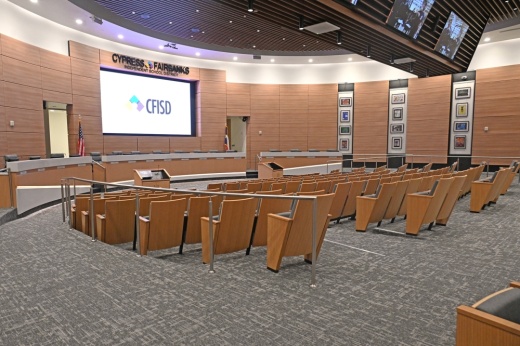Trustees Natalie Blasingame and Christine Kalmbach were the two dissenting votes on the measure.
However, chaplains may continue to volunteer in the district as citizens, as previously reported.
How we got here
Senate Bill 763, which went into effect on Sept. 1, required all public school boards to decide by March 1 whether they will permit the district to hire chaplains as district employees.
The CFISD board voted 5-0 on Feb. 12 to affirm the district’s policy that allows chaplains to volunteer in schools, with Blasingame and Kalmbach abstaining from the vote. The board decided against adding chaplain positions to the district’s payroll.
Despite the February decision, the board revisited the policy March 4. CFISD General Counselor Marney Collins Sims presented new proposals with updated language as requested. Based on the 5-2 vote, there will be no further changes to employment or volunteer policies at this time.
What they’re saying
Dozens of citizens addressed the board at the Feb. 8, Feb. 12 and March 4 meetings with a mix of support and opposition for hiring chaplains.
State Rep. Jon Rosenthal, D-Houston, urged the board to vote against hiring school chaplains. He said if the board were to change the policy that was reaffirmed in February, they should put qualifiers in place to ensure chaplains were properly vetted and trained.
“I rise tonight to urge you to vote no on school chaplains in our schools. If you choose to proceed with this, I do want to urge you to adopt sensible guidelines that actually work for this sort of thing,” Rosenthal said. “First, define chaplains to be professionals with at least a master's degree in divinity. ... Two: require parental consent before allowing a child to meet with a chaplain; ... and third, require that chaplains respect the free exercise of religion by students and their families.”
State Rep. Tom Oliverson, R-Cypress, spoke in favor of the chaplain program; however, he agreed with Rosenthal that stipulations and regulations should be put in place.
“This is a bill about improving the mental health of our students. A quick glance of the medical literature shows that there are numerous studies that support the use of chaplains as an adjunct to a multidisciplinary care team improves outcomes for anxiety, depression and a wide variety of mental health conditions,” Oliverson said. “You are not replacing counselors. That is clear. That was never the legislative intent of this bill.”





